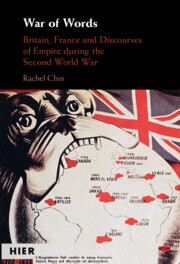Book contents
- War of Words
- War of Words
- Copyright page
- Dedication
- Contents
- Acknowledgements
- Abbreviations
- Introduction
- 1 From the Dunkirk Evacuations to the Franco-German Armistice
- 2 ‘The Real Question at Issue’
- 3 A Necessary Tragedy? The British Bombardments of the French Fleet at Mers El-Kébir
- 4 Vichy, the Free French and the Battle for Imperial Influence at Dakar in September 1940
- 5 Promises of Independence
- 6 Operation Torch
- 7 Independence on French Terms
- 8 Holding On to Empire
- Conclusion
- Bibliography
- Index
8 - Holding On to Empire
The French Bombardment of Damascus, May 1945
Published online by Cambridge University Press: 07 July 2022
- War of Words
- War of Words
- Copyright page
- Dedication
- Contents
- Acknowledgements
- Abbreviations
- Introduction
- 1 From the Dunkirk Evacuations to the Franco-German Armistice
- 2 ‘The Real Question at Issue’
- 3 A Necessary Tragedy? The British Bombardments of the French Fleet at Mers El-Kébir
- 4 Vichy, the Free French and the Battle for Imperial Influence at Dakar in September 1940
- 5 Promises of Independence
- 6 Operation Torch
- 7 Independence on French Terms
- 8 Holding On to Empire
- Conclusion
- Bibliography
- Index
Summary
In this final chapter, the related questions of the true French state and the role that empire played in conceding this legitimacy come full circle. At the head of the French Provisional Government, de Gaulle was rapidly renegotiating imperial relationships. Empire, much as it was in 1940, was a symbol of global power, sovereignty and legitimacy. In this context, the French aerial and ground bombardment of Damascus (29–30 May) was a reminder of the quotidian existence of imperial violence. It was undertaken to quell rising nationalist unrest and assert French demands for the conclusion of a preferential treaty prior to conceding independence.
However, nationalist forces in Syria and Lebanon consolidated international support for their independence demands. The San Francisco Conference was the perfect venue for condemning French barbarity. The language of the Atlantic Charter, as well as American and Soviet anti-imperial rhetoric, grounded the legitimacy and the moral basis of nationalist demands. Britain, in its role as proxy protector to the Levant states, had to act to preserve its own credibility as Middle East peacekeeper, or peace enforcer. This chapter closes under the shadow of impending Franco-British evacuations from Syria and Lebanon and the longer spectre of imperial withdrawals.
Keywords
- Type
- Chapter
- Information
- War of WordsBritain, France and Discourses of Empire during the Second World War, pp. 230 - 259Publisher: Cambridge University PressPrint publication year: 2022

